An Airbus A320 inadvertently flew below minimum safe height on approach to Christchurch Airport. It landed safely. Lesson: properly used automated flight navigation systems will reduce crew workload and result in safer flight operations. Crew chose not to use auto, did not stay aware of their location compared to standard arrival route, and air traffic controller did not alert the flight crew.
Executive summary Tuhinga whakarāpopoto
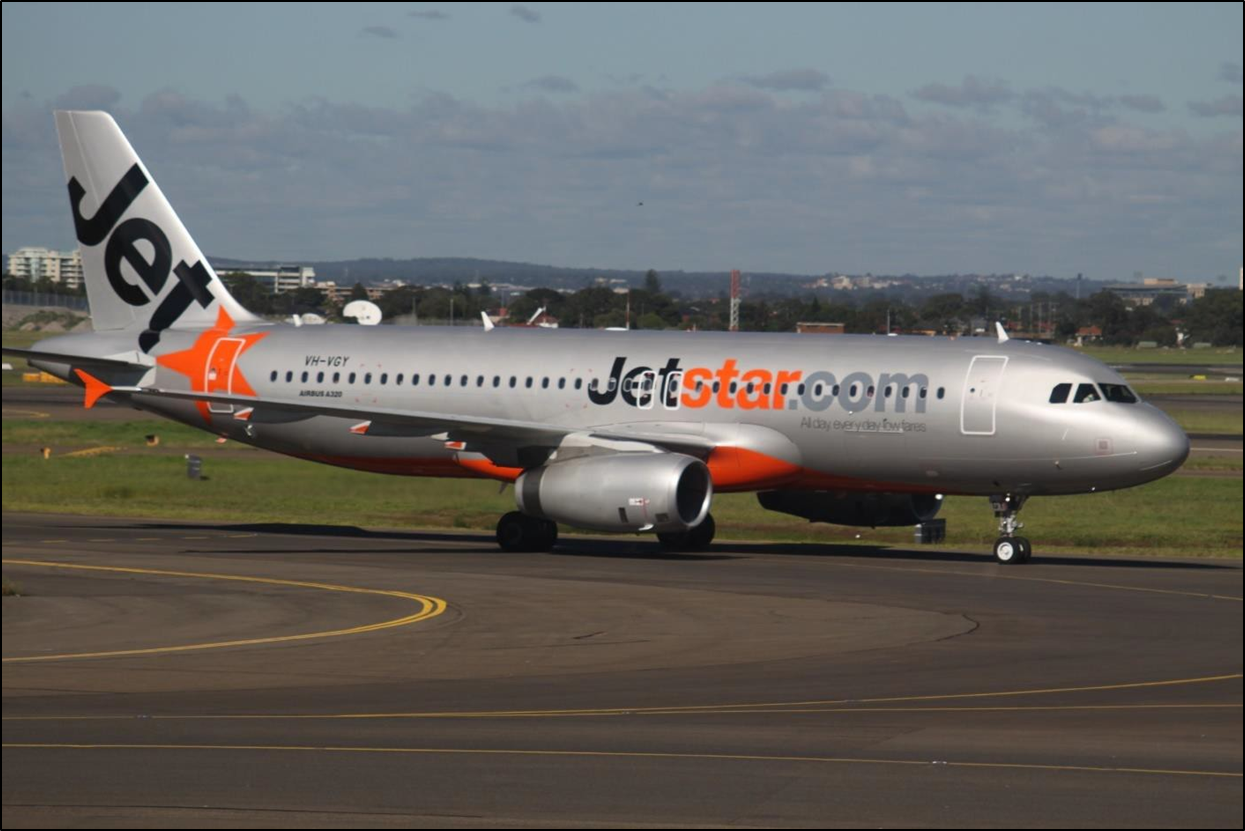
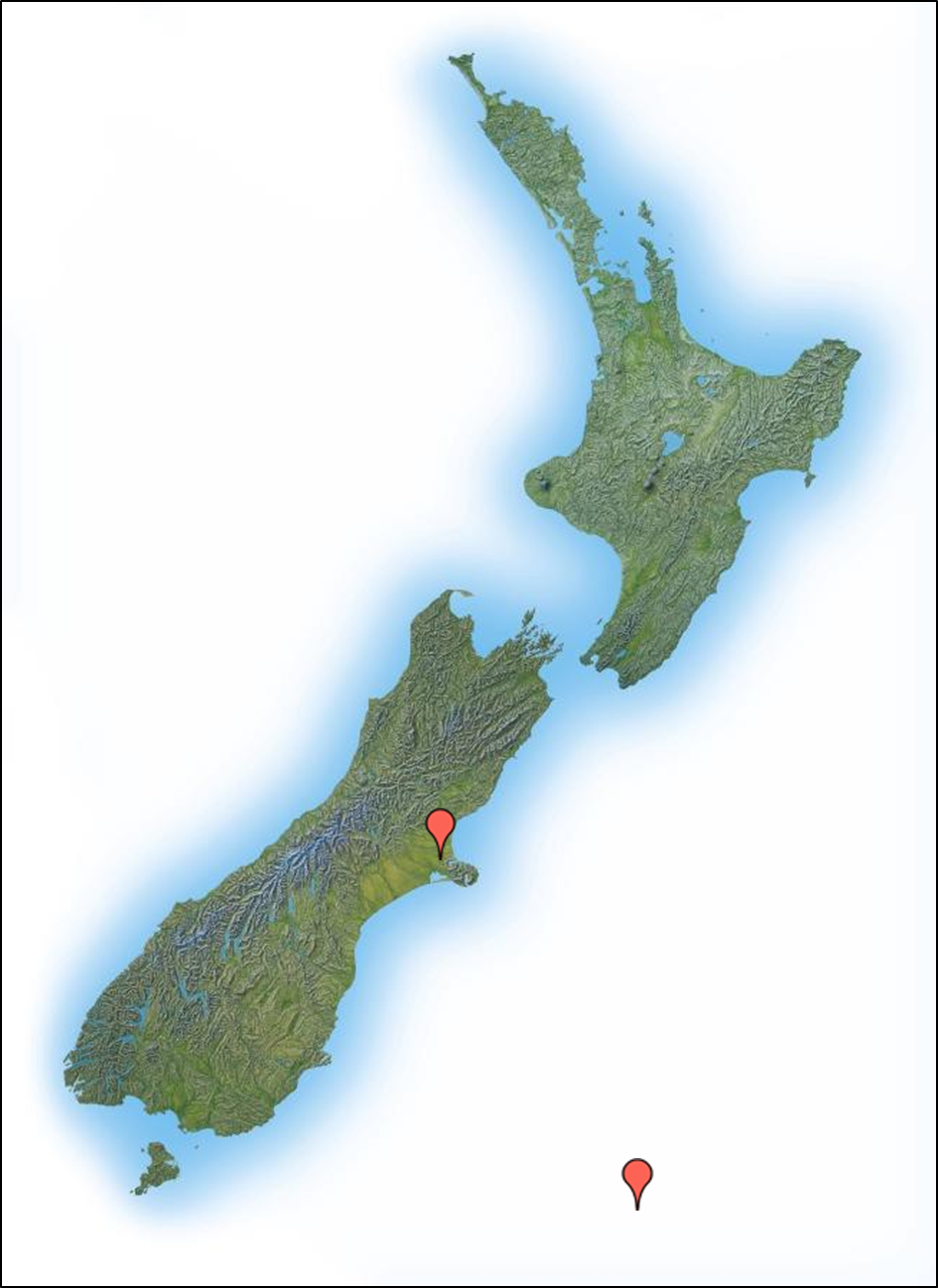
- At about 1845 on 6 August 2017, an Airbus A320 aeroplane was approaching Christchurch with 128 passengers and six crew on board. During the arrival procedure the aeroplane inadvertently descended below the 2,500-foot (760-metre) minimum safe altitude for part of the arrival procedure.
- The infringement was noticed by the air traffic controller at the time, but the flight crew was not advised until the aeroplane had landed. The aeroplane landed safely.
- The Transport Accident Investigation Commission (Commission) found that the aeroplane descended below a published minimum safe altitude for a segment of the arrival procedure, because the flight crew did not maintain adequate situational awareness of their aeroplane’s location in relation to the standard arrival route.
- The Commission also found that the operator’s procedures did not encourage the appropriate use of the aeroplane’s automated navigation systems, and that by electing to use an ‘open descent’ procedure rather than the available, fully automated ‘managed descent’ mode, and not setting the flight control unit to the next altitude restriction, a higher level of human intervention was required to keep the aeroplane within permissible limits on the arrival route.
- The Commission also found that the air traffic controller observed the aeroplane’s descent below the minimum safe altitude, but did not follow the required procedures and alert the flight crew until the aeroplane had landed.
- As a result of the safety actions taken by the operator, no new recommendations were identified.
- A key lesson arising from the inquiry is that properly used automated flight navigation systems will reduce the crew workload and result in safer flight operations. If crew choose not to use them, they must maintain a heightened level of alertness and work harder to achieve an equivalent level of situational awareness.
Conduct of the inquiry He tikanga rapunga
- Because the aeroplane involved was registered in Australia, the occurrence was notified to the Australian Transport Safety Bureau, which then notified the Commission of the incident on 9 August 2017. The Commission obtained further information before opening an inquiry under section 13(1)b of the Transport Accident Investigation Commission Act 1990, and appointed an investigator in charge.
- Air traffic control radar and flight data information was obtained from Airways New Zealand.
- Investigators interviewed the two pilots and the two air traffic controllers who provided the radar service during the aircraft’s approach to Christchurch.
- Copies of the operating procedures for the operator, the air traffic control provider and other Airbus A320 operators were obtained.
- On 6 July 2018 the Australian Transport Safety Bureau, representing the state of the operator, appointed an Accredited Representative to participate in the inquiry.
- Between July and October 2018 the operator provided additional information to the Commission.
- On 12 December 2018 the Commission approved this draft report to be circulated to interested persons for comment.
- The Commission received seven submissions on the draft report. The Commission considered the submissions, and changes as a result of those submissions have been included in the final report.
- On 27 March 2019 the Commission approved the final report for publication.
Factual information Pārongo pono
Narrative
- On Sunday 6 August 2017 an Airbus A320 registered VH-VGY (the aeroplane) was scheduled to fly from Christchurch to Wellington and return.
- The captain was based in Melbourne and had flown as a passenger to Christchurch the day before the occurrence. The captain was familiar with flying between Australia and New Zealand, but had not flown domestically within New Zealand for several years. Prior to the flight the captain had reviewed relevant aeronautical publications in preparation for the flights.
- The first officer was based in Christchurch and regularly flew between Wellington and Christchurch.
- The flight north from Christchurch to Wellington was uneventful. The captain was the ‘pilot flying’ and the first officer was performing the duties of ‘pilot monitoring’. The flight and instrument approach were flown on autopilot using the aeroplane’s auto-flight and flight management systems.
- For the return trip south, the aeroplane departed Wellington about five minutes later than scheduled, at about 1825. The first officer was now the pilot flying and the captain was the pilot monitoring. When the aeroplane was near Kaikōura the crew obtained the latest Christchurch aerodrome and weather information. This stated that the crew could expect an instrument landing system/distance measuring equipment (ILS/DME) approach to runway 02. The runway was dry with a surface wind of 300º magnetic at seven knots, visibility of at least 40 kilometres and nil significant cloud (no cloud below 5,000 feet (1,500 metres) and no towering cumulus or cumulonimbus present). At that time the pilots could see the lights of Christchurch about 150 kilometres ahead.
- The aeroplane was then cleared by air traffic control for a ‘MESIX Five Alfa Arrival’, which was the standard arrival route (also referred to as a ‘standard instrument arrival’ or ‘standard terminal arrival route’) that led into the ILS/DME approach to runway 02 at Christchurch (see Figure 1). The crew loaded the standard arrival route and the expected approach into the aeroplane’s flight management guidance system (FMGS) and conducted a briefing for the arrival, approach and landing.
- The standard arrival route included a number of altitude restrictions below which an aircraft should not descend as it proceeded along the route. These minimum altitudes were set for a number of reasons, including to provide a safe clearance above terrain and other features, for noise abatement, and to ensure efficient traffic flows. Figure 2 shows the minimum altitudes for the approach route the aeroplane was following.
- At 1834 the aeroplane was cleared to descend, at the pilots’ discretion, from flight level 240 (24,000 feet/7,300 metres [m]) to 11,000 feet (3,300 m). The first officer informed the captain of his intention to delay the descent slightly in order to fly a continuous descent at idle engine thrust, which would normally have allowed the aeroplane to meet all the ‘at or above’ altitude restrictions of the standard arrival route. To initiate the descent, the first officer selected ‘open descent’ mode on the flight control unit (FCU) (see Figure 3). In open-descent mode the aeroplane is still flown by the autopilot, but the pilots manually control the vertical (altitude) component of the flight path. This means the pilot is required to ensure that the aeroplane complies with the altitude restrictions for the standard arrival route, while the autopilot ensures that the aeroplane follows the pre-programmed lateral navigation component of the FMGS (see section 3.3 for further information).
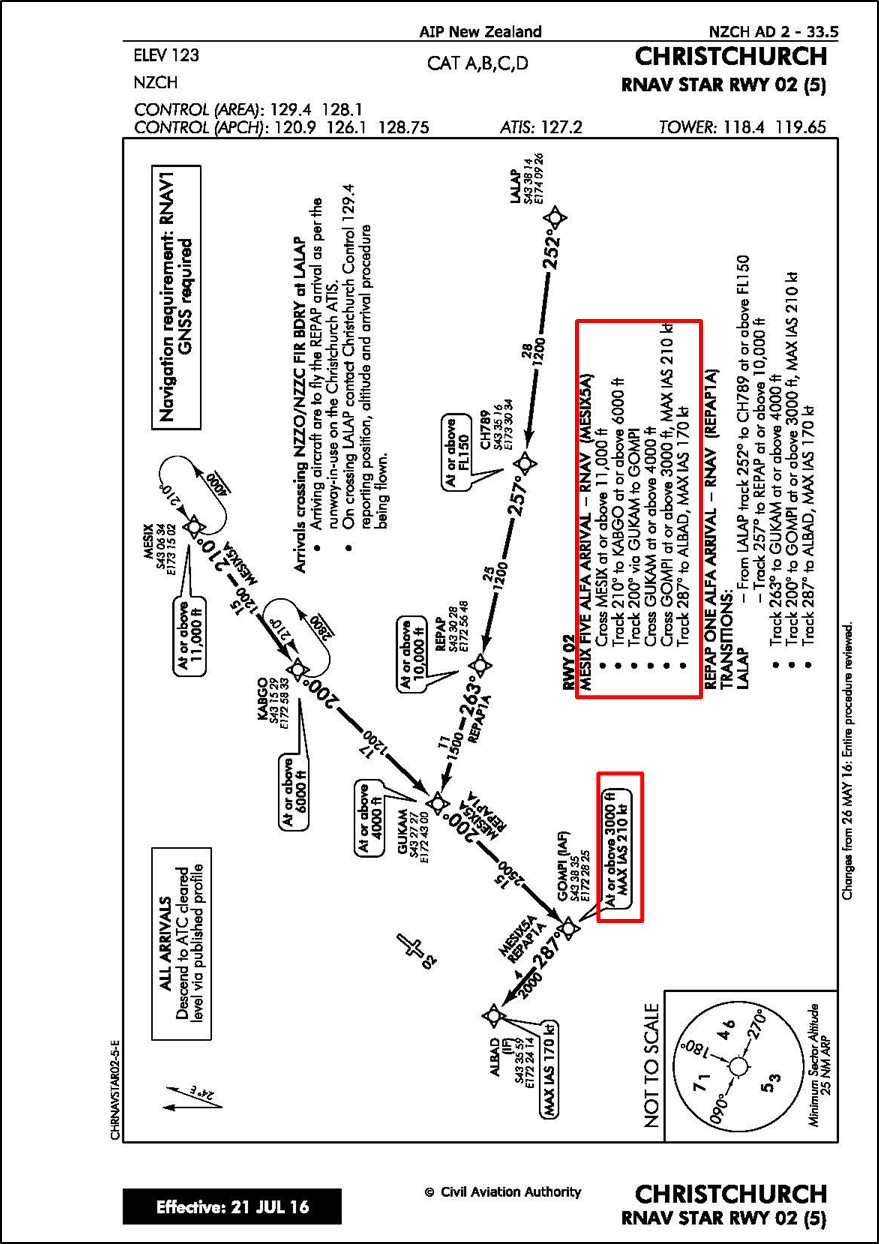
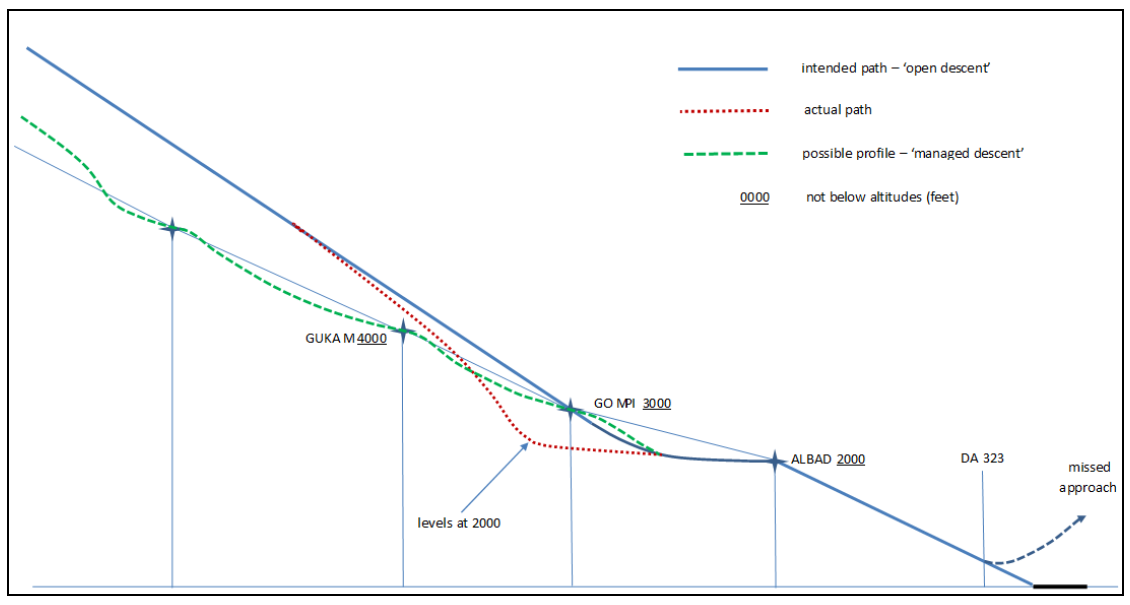
- At 1839 the crew changed radio frequency to Christchurch Approach, and reported that they were descending to 11,000 feet. The air traffic controller (the controller) cleared the aeroplane to continue the descent via the standard arrival route to 4,000 feet (1,200 m). The controller also advised that they were the second aircraft in the approach sequence. The crew read back the clearance correctly.
- At 1846 the controller instructed the aeroplane to descend via the standard arrival route to 2,000 feet (600 m), and cleared it for the ILS/DME approach to runway 02. The crew set 2,000 feet in the FCU and correctly read back the clearance. The air traffic control radar recorded that at 1846:50 the aeroplane passed overhead the GUKAM waypoint at an altitude of 4,625 feet (1,400 m). The captain later recalled that they had been above the minimum altitude of 4,000 feet when crossing GUKAM
-
Shortly after passing the GUKAM waypoint and with the runway lights in view, the first officer suggested to the captain that they request a visual approach (flying by visual reference but remaining under instrument flight rules). The captain considered the suggestion then instructed the first officer to continue with the standard arrival route.
- The aeroplane was required to remain above 3,000 feet (900 m) until it had passed the next waypoint (a geographical position used for navigation), GOMPI. At 1848:32 the aeroplane descended below 3,000 feet before reaching the GOMPI waypoint (this was captured on the Airways New Zealand radar recording). Additionally, the Christchurch standard arrival route included a minimum safe altitude of 2,500 feet (760 m) between GUKAM and GOMPI.
- The Manual of Air Traffic Services states that if a controller becomes aware or has reason to suspect that any aircraft operating under instrument flight rules (one of two sets of regulations (the other being visual flight rules), by which an aircraft can be flown by reference to instruments) is below the required obstacle clearance, the pilot shall be advised as soon as possible and every means shall be used to restore obstacle clearance as soon as possible (Airways Corporation of New Zealand Limited, Manual of Air Traffic Services, RAC 3-27, effective 5 April 2016). The required obstacle clearance included radar terrain separation and the minimum safe altitude for the route.
- At about 1850 the controller noticed that the aeroplane was approaching the GOMPI waypoint but was descending through 2,300 feet (700 m). The controller alerted the planner in an adjacent seat and together they observed the aeroplane levelling at 2,000 feet. At 1850:58 the aeroplane passed the GOMPI waypoint at 2,000 feet. The controller then instructed the crew to change to the aerodrome tower frequency for landing clearance.
- After landing, the tower controller asked the captain to call the Airways Centre duty manager. The duty manager informed the captain that the flight had descended below 3,000 feet before the GOMPI waypoint and therefore had gone below the minimum altitude for that segment of the standard arrival route. The captain had not been aware of the exceedance.
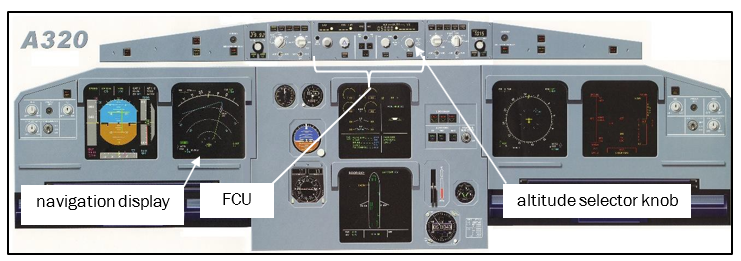
Personnel information
Captain
- The captain had joined the operator as a first officer in September 2005, flying Airbus A320 and A330 aeroplanes, and had been promoted to captain in June 2009.
- The captain held an Australian airline transport pilot licence (aeroplane) and had accrued a total of about 32,000 flying hours, including about 8,000 hours on the A320 type of aeroplane. The captain’s ‘class 1’ medical certificate, issued on 15 May 2017, was current and included a requirement that he wear glasses, which he reportedly did. The captain’s previous flight check had been on 14 September 2016 and previous simulator check on 15 May 2017.
First officer
- The first officer had flown with a New Zealand operator for two years before joining the operator in August 2016 as a first officer on A320 aeroplanes. The first officer had accrued a total of 5,620 flying hours, including 680 hours on the A320 type of aeroplane.
- The first officer held both New Zealand and Australian airline transport pilot licences. The first officer held a current ‘class 1’ medical certificate issued on 19 June 2017, with no restrictions. The first officer’s previous flight check had been on 12 April 2017 and previous simulator check on 26 April 2017.
Aircraft and operator information
- VH-VGY was an Airbus A320-232 aeroplane, manufactured in 2010 and delivered new to the operator. The aeroplane was powered by two IAE V2527-A5 turbofan engines and was configured to carry 180 passengers.
Flight management
- The A320 aeroplane was normally flown using the auto-flight systems, following a route and vertical profile that had been pre-programmed into the aeroplane’s FMGS. When the FMGS followed the flight path and speed profiles calculated by the FMGS, the guidance was said to be ‘managed’. When the flight crew set temporary flight-path parameters, such as heading or speed, the FMGS guidance was said to be ‘selected’.
- For a ‘managed descent’ and approach, the flight crew loaded into the FMGS the appropriate arrival procedure, instrument approach and predicted winds. The aeroplane then followed a descent profile (vertical navigation) and track (lateral navigation) computed by the FMGS. In managed-descent mode the FMGS ensured compliance with any altitude restriction or speed limit included in the programmed arrival and approach procedures. The pilots were able to monitor the aeroplane’s position on the programmed route, and any altitude restrictions on their navigation display.
- In ‘selected descent’ mode, pilots controlled the aeroplane’s descent using the FCU located on the instrument panel. The operator’s standard operating procedures stated that pilots could use one of two modes for selected descents: open descent or vertical speed. In open-descent mode an aeroplane would descend to the altitude selected by the pilots on the FCU. The FMGS would then disregard any intervening altitude restrictions that had been pre-programmed into the FMGS as part of the arrival procedure. However, the restrictions would continue to be shown on the navigation displays and the aeroplane would remain on the pre-programmed route (see Figure 4).
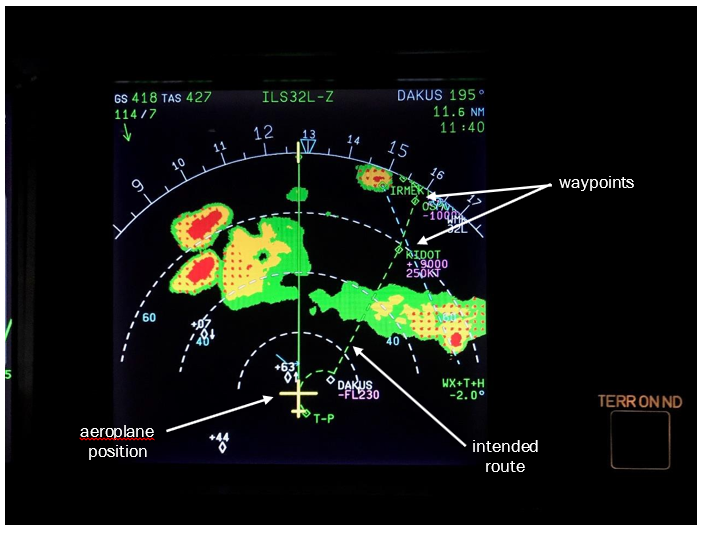
Previous occurrence
- On 16 July 2012 another of the operator’s A320 aeroplanes had been cleared to descend as part of an Area Navigation (Required Navigation Performance) approach (a performance-based navigation approach allowing an aircraft to fly a precise flight path between two defined three-dimensional points, with the requirement for on-board performance monitoring and alerting. No ground-based aids are required.) into Queenstown. The pilots had been concerned about potential strong tailwinds, so they had begun the descent in open-descent mode with the intention of reverting to managed-descent mode for the instrument approach. However, in that case the crew had forgotten to revert to the managed-descent mode and the aeroplane had descended below an approach segment minimum safe altitude. The crew had recognised this and immediately climbed to regain the required approach path.
- An investigation by the Australian Transport Safety Bureau had determined that “contrary to their intentions, the pilots continued descent with the auto-flight system in open-descent mode, which did not provide protection against infringing the instrument approach procedure’s segment minimum safe altitudes” (Australian Transport Safety Bureau Transport Safety Report AO-2012-103, Descent below segment minimum safe altitudes involving Airbus A320-232 VH-VQA, near Queenstown, New Zealand on 16 July 2012). Contributory factors included:
- a reliance on ‘prospective memory’, despite its limitations, to remind the pilots to switch from open-descent mode to managed-descent mode
- the pilots not maintaining awareness of the descent profile in relation to the instrument approach procedure’s segment minimum safe altitudes
- the pilots not strictly adhering to the operator’s sterile flight deck procedures
- the operator’s procedures providing limited protection against descent through an instrument approach procedure’s segment minimum safe altitudes.
-
As a result of the occurrence the Australian Transport Safety Bureau had commented that the operator had provided additional guidance material for pilots to help ensure there was a better awareness of autopilot modes. The operator had also stated in the report that.
Approach charts specify minimum segment altitudes prior to the VIP [vertical intercept point]. Managed descent mode provides protection against infringing these minimum altitudes. If selected modes are used, pilots must exercise caution in complying with these altitudes. It is strongly recommended that pilots use managed descent mode in preference to selected vertical modes, especially when re-intercepting the vertical path from above the VIP.
Analysis Tātaritanga
Introduction
- The flight was a scheduled passenger service between Wellington and Christchurch, operating under instrument flight rules. As the aeroplane approached Christchurch it descended below minimum altitudes on two accounts. First, it descended below the clearance limit of 3,000 feet before reaching the GOMPI waypoint. Second, it descended below the minimum safe altitude of 2,500 feet.
- Minimum clearance and safe altitudes are set for a good reason: to provide a safety margin between aircraft and terrain or obstacles. When an aircraft breaches these limits, it is operating one step closer to a serious incident or accident. When an air traffic services safety system does not detect or respond to this type of breach, there is a risk of such events becoming normalised and undermining the safety of the system.
- The following analysis discusses what happened and how relying less on aircraft automation and more on human performance can increase the risk to safe flight operations in some cases.
Descent below minimum permitted altitude
- The captain had not flown domestically within New Zealand for several years, and was therefore less familiar with flying between Wellington and Christchurch than the first officer.
- The first officer was more familiar with the route. It had also become common practice for the first officer to delay commencing the descent into Christchurch and to set the aeroplane’s navigation systems to open-descent mode before commencing the instrument approach. Using open-descent mode was not inconsistent with the operator’s standard operating procedures.
- In open-descent mode the aeroplane was programmed to descend directly to the altitude set in the FCU (2,000 feet), ignoring the intermediate altitude restrictions contained in the standard arrival route. The first officer had used this descent profile previously at Christchurch and was confident of being able to maintain a steady descent to the commencement altitude for the instrument approach.
- However, on this occasion the aeroplane descended below the intended profile and consequently below the 3,000-foot minimum altitude limit between GUKAM and GOMPI, and also below the 2,500-foot minimum safe altitude limit until past GOMPI. The 3,000-foot limit was a procedure limit, while the 2,500-foot minimum safe altitude limit provided separation from terrain along the GUKAM-to-GOMPI track.
Defences
- To help ensure that arrival procedure requirements were met, a range of safeguards was available to the flight crew, including:
- the FMGS
- the navigation display
- the operator’s standard operating procedures
- crew resource management (the effective use of all available resources for flight crew personnel to assure a safe and efficient operation, reducing error, avoiding stress and increasing efficiency.)
- air traffic control.
Flight management guidance system
- The FMGS, when used in ‘managed-descent’ mode, automatically directs an aeroplane to follow a programmed arrival procedure and ensures that it remains within the allowable limits. Little pilot input is required because the auto-flight system controls the aeroplane. When open-descent mode is used, the aeroplane follows the same lateral navigation element, but the FMGS commands a descent directly to the altitude the pilot sets in the FCU. The pilot is then required to ensure that the aeroplane remains above any intermediate altitude restrictions.
- The operator advised that open-descent mode was regularly used by pilots in both Australia and New Zealand, and no specific descent mode was preferred. Each mode had its advantages and limitations. For example, managed-descent mode cannot be used during radar vectoring, where a controller gives heading, and probably altitude, instructions for the aeroplane to follow.
- The operator’s procedures did not require pilots using open-descent mode to reset the FCU to the next intermediate altitude restriction. The operator explained that resetting the FCU to each intermediate altitude restriction during a descent could cause issues with mode reversion and reduce the efficiency of the descent profile because the aeroplane attempts to capture each altitude. If the FCU is reset to the next altitude restriction just as the aircraft approaches the current limit, the pitch mode of the autopilot may change or revert from either managed or selected open-descent mode to vertical-speed mode, which can cause confusion (the Airbus flight crew operating manual states that when the FCU altitude is set to “a target not compatible with the active open mode, a mode reversion occurs and V/S [vertical speed] engages on current V/S”). The operator advised that it had had “many” instances of mode reversion.
- The Commission reviewed the flight management procedures for two other operators that flew the A320. One operator advised that its pilots were directed to fly in managed-descent mode where possible, and were only to use open-descent mode in exceptional circumstances. Should an open descent be flown, pilots were required to set the FCU altitude to the next intermediate altitude or restriction. This FCU requirement was also contained in the descent procedures for the third operator.
- The procedures for each of the three operators all referred to the same information on mode reversion provided by the manufacturer, Airbus. However, the deputy training manager responsible for A320 standards and training for one of the operators explained that mode reversion was not a significant issue for them. The manager explained that this was likely because their pilots didn’t often conduct open descents, and thus their pilots were probably more proactive in managing descents, which would include resetting the FCU to avoid any incompatibility. If a mode reversion occurred, the pilots were immediately aware of it and reacted accordingly.
- Jetstar did not have procedures requiring the FCU be set to the next intermediate altitude restriction, which meant that adherence to any altitude restriction relied less on the aeroplane’s automation and more on the pilots’ performance. This is discussed further in the following sections.
Navigation display
- The FMGS and the auto-flight system are intended to ease a pilot’s workload, allowing the crew to focus on ensuring the continued safe operation of the aeroplane. In managed-descent mode the FMGS follows a programmed procedure. However, in some conditions the aeroplane may deviate from the planned flight path. To protect against this, pilots need to monitor the performance of their aeroplane continually, and intervene to avoid any potential limit exceedance. For the A320, this monitoring information is presented to the pilots by a number of means, primarily the navigation display.
- The navigation display provides a pilot with a view of the intended track the aeroplane is programmed to fly, and the position of the aeroplane along that track (see Figure 4) (this complements the arrival chart (Figure 2) carried on the aeroplane). The display can also show any restrictions along the track, for example not below 3,000 feet until past GOMPI. By checking the navigation display, including a vertical situation display if fitted, and if required cross-checking this against the procedure chart, a pilot should be able to confirm quickly their position on the procedure and that they are complying with any restriction.
- This information was available to the pilots on the aeroplane’s navigation display, but was either not referred to by the pilots or not clearly appreciated.
Standard operating procedures
- Standard operating procedures help to promote safety through consistency of performance and efficiency, while reducing miscommunication and non-compliance. Standard operating procedures have been developed to cover every aspect of flight deck activity, embracing normal, abnormal and emergency situations.
- The operator’s procedures included references to Airbus’s ‘Golden Rules’, which “take into account the principles of flight crew interaction with automated systems, and the principles of crew resource management” (discussed in the next section). The Golden Rules are:
- Fly, Navigate and Communicate
- Use the appropriate level of Automation at all times
- Understand the Flight Mode Annunciator
- Take action if things do not go as expected.
- In following these rules, the crew could have given more consideration to the captain’s unfamiliarity with the route and the standard arrival route being flown, and therefore used the full automation available. However, descending in open-descent mode would have worked had the pilots followed rule #1 and cross-referred to their approach chart and navigation display to confirm their progress and predict the aeroplane’s position in relation to minimum safe altitudes (commonly referred to as ‘staying ahead of the aeroplane’).
Crew resource management
- Crew resource management recognises the integral role of each crew member, flight crew and cabin crew in achieving a safe flight. Major airlines train crew members in crew resource management, focusing on interpersonal communication, leadership and decision-making.
- The aeroplane was approximately 600 feet (180 m) above the minimum altitude restriction of 4,000 feet as it flew over the GUKAM waypoint. It was then that the pilots needed to check the next altitude restriction, as depicted on the approach chart and their navigation displays, and ensure that the restriction would be met. The pilots later acknowledged that if they did do this they did not discuss it with each other.
- Communication and cross-checking at key points are important for pilots maintaining situational awareness (the perception of the elements in the environment within a volume of time and space, the comprehension of their meaning and the projection of their status in the near future) and are an important aspect of crew resource management.
Air traffic control
- In this incident the controller observed an aeroplane that had descended below the next waypoint altitude limit of 3,000 feet and the route minimum safe altitude limit of 2,500 feet. There were no complicating circumstances in terms of traffic flow or density.
- The Manual of Air Traffic Services sets out the procedures for responding to air traffic situations. The preface to the manual states that it is not practicable for the document to cater for all combinations of air traffic situations, and that controllers are to use their judgement. However, in a straightforward situation with no complicating circumstances, the controller has no reason to deviate from the standard procedure.
- In this case the standard procedure was to inform the crew immediately and direct a climb, or at least to alert the aeroplane crew to the exceedance. The controller took neither of these actions (aircraft operating under radar control and flying the same route could be approved to operate as low as 2,000 feet, with a minimum radar terrain separation of 1,600 feet (487 m) around GOMPI). The controller and planner said they had observed the aeroplane level at 2,000 feet and, seeing that it was not descending further, the controller decided not to alert the crew for concern it might distract them at a critical phase of the flight.
- When it is appropriate to do so, controllers should normally follow standard procedures. To do otherwise would risk normalising non-standard responses to air traffic situations, which could result in a permanent reduction in safety standards.
Summary
- Had the arrival procedure been flown in managed-descent mode, all procedure requirements would highly likely have been achieved. However, the flight crew, as permitted by the operator’s procedures, elected to use open-descent mode and to set the FCU altitude to the final altitude cleared by air traffic control. However, the controller gave the pilots clearance to 2,000 feet via the standard arrival route. The standard arrival route included several intermediate altitude restrictions along the arrival route. Had the pilots opted to use managed-descent mode, the aeroplane would automatically have levelled off rather than descend below any of the intermediate altitude restrictions, the aeroplane’s automation thus providing an additional defence against the aeroplane exceeding published minima.
- The crew instead opted to fly in open-descent mode, which required them to either manually enter the intermediate minimum altitudes or continuously monitor the aeroplane’s progress along the approach path and intervene manually to ensure it remained above minima. However, the crew did not discuss the progress of the aeroplane against the standard arrival route altitude restrictions. As a result, they did not detect that the aeroplane had descended below a minimum altitude limit for the procedure.
- The Australian Transport Safety Bureau investigation into the similar 2012 incident involving the same operator had identified mode awareness as a central issue. The crew in that case had relied on their prospective memory to remember to change the mode from open descent to managed descent once they had regained the intended flight path. The crew had subsequently forgotten to change mode and the aeroplane had descended below the approach altitude restrictions for two of the segments of the arrival procedure. A missed mode change was not the issue in this latest incident, as the flight crew deliberately selected open-descent mode and intended to maintain that until partway through the arrival procedure. Rather the issue was the flight crew not maintaining full situational awareness.
- The crew could have followed the operator’s procedures more actively and used the on-board systems, such as the navigation display, to ‘stay ahead’ of the aeroplane. This was especially so as the aeroplane descended in open-descent mode, with the automated defences that would have been available in managed-descent mode now disabled. As the aeroplane passed each segment of the arrival procedure they should have referred to the navigation chart or display and reminded themselves of the next restriction, and ensured that the aeroplane would meet it.
- There is nothing wrong with following such an arrival procedure using the open-descent mode. However, the aircraft automation in managed-descent mode provides an important defence against aircraft descending below minima. Using open-descent mode relies more heavily on crew performance to manage the descent, so if it is to be used, operators need to have procedures that ensure a high standard of crew resource management to provide a comparable level of flight safety.
Findings Ngā kitenga
- The aeroplane descended below a published minimum safe altitude for a segment of the arrival procedure, because the flight crew did not maintain adequate situational awareness of their aeroplane’s location in relation to the standard arrival route.
- The flight crew elected to use an ‘open descent’ procedure rather than the available, fully automated ‘managed descent’ mode, which required a higher level of human intervention to keep the aeroplane within permissible limits on the arrival route.
- The operator’s procedures did not encourage the appropriate use of the aeroplane’s automated navigation systems; this increased operational risk by placing more reliance on human performance.
- The air traffic controller observed the aeroplane’s descent below the minimum safe altitude, but did not follow the required procedures and alert the flight crew until the aeroplane had landed.
Safety issues and remedial action Ngā take haumanu me ngā mahi whakatika
General
-
The Commission classifies safety actions by two types:
(a) safety actions taken by the regulator or an operator to address safety issues identified by the Commission during an inquiry that would otherwise result in the Commission issuing a recommendation
(b) safety actions taken by the regulator or an operator to address other safety issues that would not normally result in the Commission issuing a recommendation.
Safety actions addressing safety issues identified during an inquiry
-
The operator produced an internal report into this occurrence. The report highlighted the use of the Airbus ‘Golden Rules’, which are:
(1) Fly, Navigate and Communicate
(2) Use the appropriate level of Automation at all times
(3) Understand the Flight Mode Annunciator
(4) Take action if things do not go as expected.
- The operator’s report found that the captain and first officer, because of their different experience levels and familiarity with the local procedures, developed different mental models of the approach. The pilots did not use the appropriate level of automation and allowed themselves to be distracted from monitoring the arrival procedure.
- The operator’s internal report resulted in a Flight Standing Order being issued, effective 23 February 2018. The order included a revised procedure for flight-path monitoring and discussed such topics as pilot duties, monitoring and communication.
- On 3 March 2018 the operator provided its training and check staff with further information and discussion on the subjects described in the previous paragraph.
- The operator also advised that on 1 October 2018 it had transitioned its flight crew training to evidence-based training. Evidence-based training recognises that most occurrences have an element of reduced situational awareness and can be effective in improving the defences against this human condition. Evidence-based training moves away from scripted simulator training programmes to unknown-scenario-based activities that focus on problem-solving, crew resource management, threat and error management and resilience.
Recommendations Ngā tūtohutanga
No new recommendations were identified
Key lessons Ngā akoranga matua
- Properly used automated flight navigation systems will reduce the crew workload and result in safer flight operations. If crew choose not to use them, they must maintain a heightened level of alertness and work harder to achieve an equivalent level of situational awareness.
Glossary Kuputaka
- Altitude
- Above mean sea level
- Crew resource management
- KiwiRail’s framework for non-technical skills including situational awareness, conscientiousness, communication, decision-making and action, co-operation and working with others, workload management and self-management.
- ILS
- instrument landing system
- DME
- distance measuring equipment
- Instrument flight rules
- Rules that allow properly equipped aircraft to be flown under ‘instrument meteorological conditions’ (conditions expressed in terms of visibility, distance from cloud, and ceiling less than the minima specified for visual meteorological conditions)
- Pilot flying
- the pilot responsible for controlling the aeroplane
- Situational awareness
- Situational awareness relates to an individual’s understanding of their surroundings. This includes their perception of data from their environment, comprehension of the meaning and significance of the situation, and projection to future states and events.
- Waypoint
- A specified point on a chart for a planned passage
Data summary Whakarāpopoto raraunga
Details
latitude: 43° 38´ 35” south
longitude: 172° 28´ 25” east
